The Best War Movies on Netflix
Photo by Reiner Bajo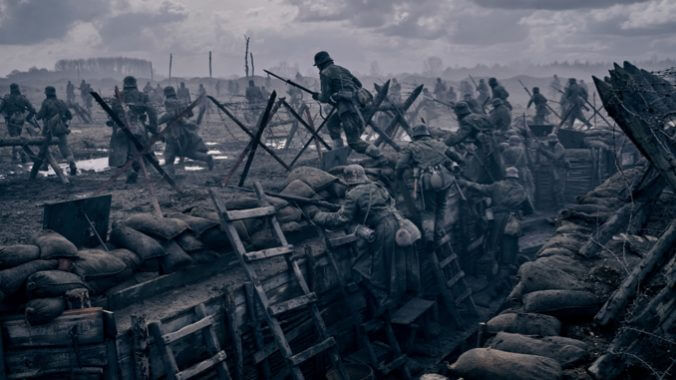
There aren’t a ton of war movies on Netflix, but that doesn’t mean the streaming service doesn’t have some great ones available. There’s no “War Movie” category, so we’ve dug through their catalog to find some classics, some little-seen gems and even one of the best Netflix originals to date. We’ve broadened the definition from our list of the Best War Movies of All Time, but we have limited the selections to movies about actual wars (no Star Wars or other imagined conflicts).
Here are the best war movies on Netflix:
1. The Hurt Locker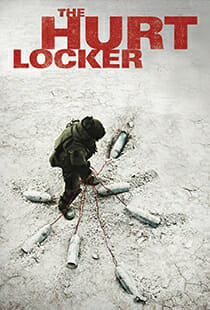 Year: 2008
Year: 2008
Director: Kathryn Bigelow
Stars: Jeremy Renner, Anthony Mackie, Brian Geraghty
Rating: R
Runtime: 130 minutes
Kathryn Bigelow’s Zero Dark Thirty may have been more ambitious in its step-by-step chronicle of the efforts to find and kill Osama bin Laden, but her preceding War on Terror film, The Hurt Locker, remains the more resonant achievement. It’s essentially a character study in the guise of an action movie, with Bigelow’s subject Staff Sgt. William James (Jeremy Renner), a devil-may-care maverick who not only has a knack for disarming bombs, but loves doing it to a reckless degree. Beyond its hair-raising action and suspense set pieces, much of the film’s drama is driven by the tensions James’s hot-dog tendencies create between himself and everyone around him. But perhaps the film’s most noteworthy achievement lies in the way Bigelow uncannily inhabits James’s perspective while also standing outside of it. When, in its quiet epilogue, James finds himself immediately bored by suburban life and itches to return to the adrenalized theater of war, after nearly two hours of relentless nerve-wracking tension, we in the audience feel the same sense of stagnation he does. “War is a drug,” says journalist Chris Hedges in a quote that opens the film. In The Hurt Locker, Bigelow makes us understand that perspective in the most visceral way possible, to truly revelatory effect. —Kenji Fujishima
2. Da 5 Bloods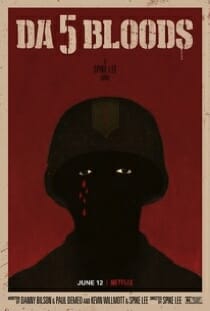 Year: 2020
Year: 2020
Director: Spike Lee
Starring: Clarke Peters, Delroy Lindo, Norman Lewis, Isiah Whitlock Jr., Chadwick Boseman, Jonathan Majors, Mélanie Thierry, Paul Walter Hauser, Jasper Pääkkönen, Jean Reno, Lê Y Lan, Johnny Trí Nguy?n
Rating: R
Runtime: 156 minutes
The hunt for buried gold neither ends well nor goes off without a hitch. The long road to reconciliation, whether with one’s trauma, family or national identity, is never without bumps. Glue these truths together with the weathering effects of institutional racism, add myriad references to history—American history, music history, film history—and you get Spike Lee’s Da 5 Bloods, a classically styled Vietnam action picture made in his cinematic vision. As in 2018’s BlacKkKlansman, Lee connects the dots between past and present, linking the struggle for civil rights couched in conscientious objection and protest to contemporary America’s own struggle against state-sanctioned fascism. After opening with a montage of events comprising and figures speaking out against the Vietnam War, referred to predominantly as the American War throughout the rest of the movie, Lee introduces four of the five bloods: Otis (Clarke Peters), Paul (Delroy Lindo), Eddie (Norm Lewis) and Melvin (Isiah Whitlock Jr.), bonded Vietnam vets returned to Ho Chi Minh City ostensibly to find and recover the bones of their fallen squad leader, Norman (Chadwick Boseman). There’s more, of course, “more” being around $17 million in gold bars planted in Vietnamese soil, property of the CIA but reappropriated by the Bloods as reparations for their personal suffering as men fighting a war for a country governed by people who don’t care about their rights. Lee’s at the height of his powers when bluntly making the case that for as much time as has passed since the Vietnam War’s conclusion, America’s still stubbornly waging the same wars on its own people and, for that matter, the rest of the world. And Lee is still angry at and discontent with the status quo, being the continued oppression of Black Americans through police brutality, voter suppression and medical neglect. In this context, Da 5 Bloods’ breadth is almost necessary. As Paul would say: Right on. —Andy Crump
3. Beasts of No Nation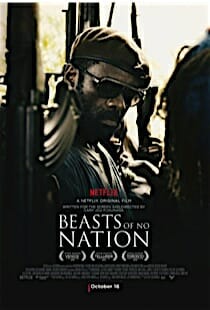 Year: 2015
Year: 2015
Director: Cary Fukunaga
Stars: Idris Elba, Abraham Attah, Emmanuel Nii Adom Quaye
Rating: NR
Runtime: 120 minutes
A harrowing descent into a modern-day heart of darkness, Beasts of No Nation channels Francis Ford Coppola’s Vietnam epic Apocalypse Now for its tale of one child’s recruitment into an African rebel battalion. Adapting Uzodinma Iweala’s novel with fearsome intimacy, writer/director Cary Fukunaga depicts his unidentified African setting as a mixture of lushly green forests, bullet-shattered villages and mist-enshrouded horizons—the last of which is due, at least in part, to the fires that rage throughout the countryside. Those conflagrations are the result of a conflict between government and revolutionary forces, the specifics of which the film, like its precise locale, leaves more or less vague. Fukunaga’s film is thus mired in a hazy, nightmarish fugue of violence and degradation, the director presenting a landscape of hellish depravity and amorality through the eyes of one young boy unwittingly swept up in his nation’s insanity. A coming-of-age saga twisted into unholy form, Beasts of No Nation eschews undue melodramatic manipulations (and avoids romanticizing its perversions) in charting Agu’s maturation into a pitiless soldier. —Nick Schager
4. Ip Man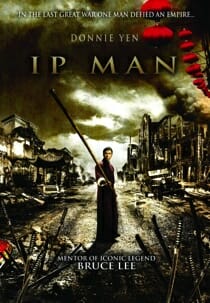 Year: 2008
Year: 2008
Director: Wilson Yip
Stars: Donnie Yen, Lynn Hung, Dennis To, Syun-Wong Fen, Simon Yam, Gordon Lam
Rating: R
Runtime: 106 minutes
2008’s Ip Man marked, finally, the moment when the truly excellent but never fairly regarded Donnie Yen came into his own, playing a loosely biographical version of the legendary grandmaster of Wing Chung and teacher of a number of future martial arts masters (one of whom was Bruce Lee). In Foshan (a city famous for martial arts in southern/central China), an unassuming practitioner of Wing Chung tries to weather the 1937 Japanese invasion and occupation of China peacefully, but is eventually forced into action. Limb-breaking, face-pulverizing action fills this semi-historical film, which succeeds gloriously both as compelling drama and martial arts fan-bait. —K. Alexander Smith
5. Zero Dark Thirty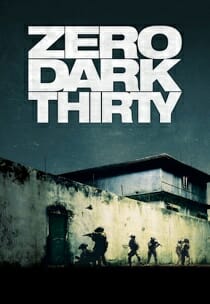 Year: 2012
Year: 2012
Director: Kathryn Bigelow
Starring: Jessica Chastain, Jason Clarke, Joel Edgerton, Jennifer Ehle, Mark Strong, Kyle Chandler, Edgar Ramirez, Harold Perrineau, Mark Duplass, James Gandolfini
Rating: R
Runtime: 157 minutes
It’s a rare occasion when a major theatrical film is as timely as director Kathryn Bigelow’s widely acclaimed military drama, Zero Dark Thirty. Bigelow had been collaborating with her The Hurt Locker screenwriter Mark Boal on a film about the futile hunt for Osama bin Laden when the al-Qaeda overlord met his demise via Seal Team 6. Bigelow and Boal rewrote the entire final act—quickly—changing their film, but sticking to the basic facts. The result is a remarkably thorough, unexpectedly cinematic, two-and-half-hour chronicle of American persistence. The pervading emotion one derives from Zero Dark Thirty is a sense of gratitude, not only for the intel brains and military balls that infiltrated the cover surrounding the world’s most wanted man, but that someone like Michael Bay didn’t get his explosive-happy hands on this story. Jessica Chastain has a sort of gritty elegance as Maya, an intelligence operative who begins her assignment in 2003 a little green around the edges, and ends it in 2011 as a tough, semi-obsessed expert. Bigelow’s direction is as structured and familiar as it’s ever been; she’s just never had this much subject matter to cover. Her spit and polish as an action filmmaker is a fantastic complement—and contradiction—to Boal’s exhaustive, investigative-reporter style of story development. Think of Zero Dark Thirty as a Hollywood adaptation of a step-by-step CIA report, complete with false leads, shots in the dark, prisoner interrogation, hesitant decision-making and thousands of hours of surveillance video. Zero Dark Thirty might not be groundbreaking, but it’s tight and comprehensive, and just conventional enough to be recognized by any moviegoer as an American Thriller. And a really good one, at that. —Norm Schrager
-

-

-

-

-

-

-

-

-

-

-

-

-

-

-

-

-

-

-

-

-

-

-

-

-

-

-

-

-

-

-

-

-

-

-

-

-

-

-

-

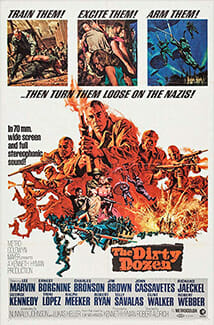 Year: 1967
Year: 1967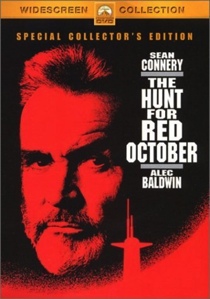 Year: 2012
Year: 2012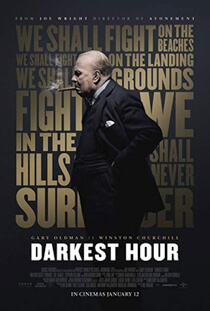 Year: 2017
Year: 2017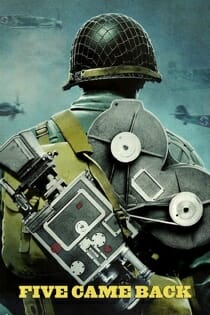
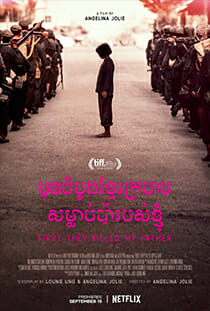 Year: 2017
Year: 2017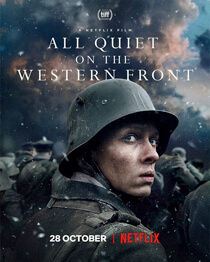 Year: 2022
Year: 2022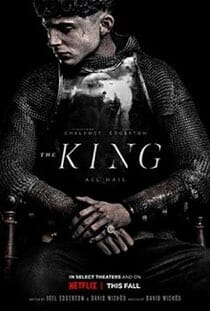 Year: 2019
Year: 2019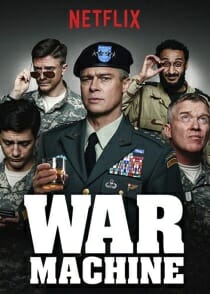 Year: 2014
Year: 2014






































